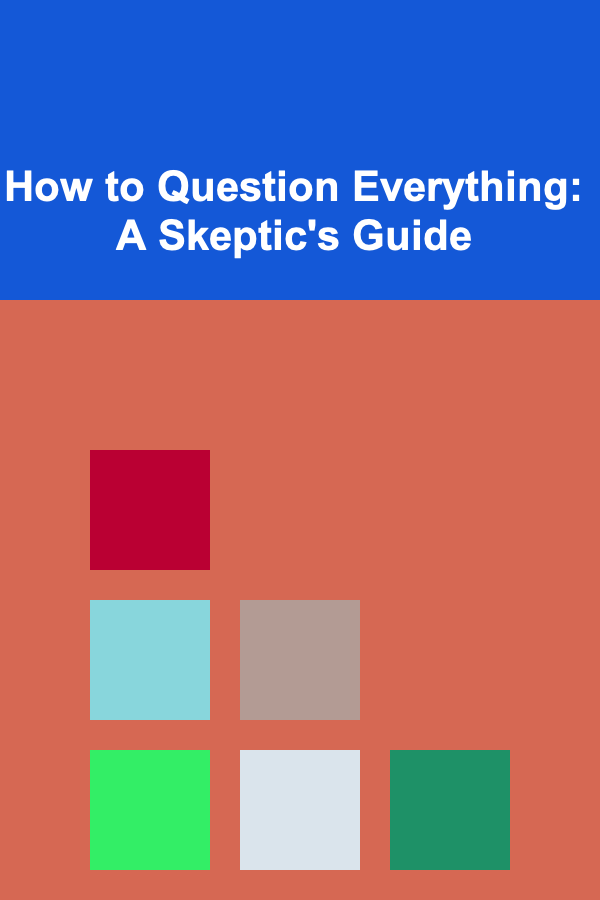
How to Question Everything: A Skeptic's Guide
ebook include PDF & Audio bundle (Micro Guide)
$12.99$6.99
Limited Time Offer! Order within the next:

The ability to question everything is one of the most powerful skills you can develop. Whether in the realm of science, philosophy, politics, or everyday life, skepticism serves as a critical tool for seeking truth and avoiding manipulation. Skepticism is not about doubting everything for the sake of doubt, but rather about cultivating a mindset that evaluates evidence, challenges assumptions, and seeks a deeper understanding of the world around us. In this guide, we will explore how to question everything effectively, helping you to sharpen your critical thinking and develop a more nuanced approach to information.
Understanding Skepticism
Before delving into the "how," it is important to define what skepticism truly means. Skepticism is often misunderstood as mere cynicism or distrust, but it is far more than that. At its core, skepticism is the practice of questioning the validity of claims, beliefs, or ideas based on evidence and reason rather than accepting them at face value. A skeptic is someone who asks, "What evidence supports this claim?" rather than simply accepting information because it is popular, authoritative, or comfortable.
Skepticism isn't about dismissing ideas arbitrarily. It's about scrutinizing them through a lens of reason and evidence. In a world filled with misinformation, biased narratives, and complex issues, the ability to question everything is invaluable. It empowers you to navigate ambiguity, find truth, and protect yourself from exploitation.
The Importance of Questioning
The act of questioning is fundamental to the progress of human knowledge. Some of the most important breakthroughs in science, philosophy, and society came about because individuals dared to question prevailing assumptions.
For example, in the 16th century, Copernicus questioned the geocentric model of the universe, proposing that the Earth revolves around the sun instead. His skepticism toward the commonly accepted view led to the development of modern astronomy.
Similarly, skepticism in philosophy has led to the development of critical thinking skills, from Socratic questioning to the scientific method. Philosophers like Descartes and Hume questioned the nature of knowledge, existence, and perception, laying the groundwork for modern epistemology.
But skepticism is not just for intellectual pursuits; it also has real-world implications. In politics, media, and social issues, skepticism helps you avoid manipulation, question authority, and make more informed decisions. In a world where social media algorithms often reinforce biases and where fake news can spread quickly, questioning everything becomes essential for maintaining a healthy democratic society.
Developing a Skeptical Mindset
So, how does one cultivate a skeptical mindset? Below are key strategies to help you develop the ability to question everything effectively.
1. Adopt the Principle of Intellectual Humility
The first step in becoming a true skeptic is to practice intellectual humility. Intellectual humility means acknowledging that no matter how much you know, there is always more to learn. It involves being open to changing your beliefs and ideas when presented with new evidence or compelling arguments.
A person with intellectual humility does not arrogantly claim to have all the answers. Instead, they approach every situation with the understanding that their knowledge is limited and that they could be wrong. This mindset helps prevent the confirmation bias that leads people to seek out only information that supports their existing beliefs.
To practice intellectual humility:
- Accept that you don't know everything.
- Be willing to entertain alternative viewpoints.
- Recognize that all knowledge is subject to revision as new evidence emerges.
2. Seek Out Reliable Sources
One of the most important aspects of skepticism is knowing where to look for credible evidence. Not all sources are created equal. In an era where information is abundant and often unverified, distinguishing between reliable and unreliable sources is crucial.
To become a better skeptic:
- Prioritize peer-reviewed research, expert opinions, and reputable institutions.
- Be wary of sources with a clear agenda or those that rely heavily on anecdotal evidence.
- Cross-check information with multiple sources to ensure consistency and reliability.
It's essential to be critical not only of the content but also of the source. In an era of "fake news" and misinformation, the credibility of the source can make all the difference. For example, social media platforms are often rife with unreliable information, which may be spread by individuals with personal biases or vested interests.
3. Question Assumptions
Skepticism is rooted in questioning assumptions, both your own and others'. We all hold certain assumptions about the world, many of which we may not even be consciously aware of. These assumptions shape our understanding and influence our decisions. However, assumptions are often unexamined and can be incorrect.
To effectively question assumptions:
- Challenge the status quo. Ask why things are the way they are, and consider whether there could be a different way of understanding them.
- Reflect on your own assumptions and ask whether they are based on evidence or merely habit.
- Be willing to entertain the possibility that your deeply held beliefs might be wrong.
For instance, in the realm of politics, questioning assumptions about the "rightness" of certain policies or ideologies can lead to more constructive discussions and better-informed opinions. This type of questioning helps break through the echo chambers of groupthink and encourages open-mindedness.
4. Embrace the Scientific Method
The scientific method is one of the most powerful tools for skeptical inquiry. It involves forming hypotheses, conducting experiments, gathering data, and refining theories based on evidence. While the scientific method is typically used in science, it can also be applied to many other areas of life.
By embracing the scientific method, you can approach problems systematically and logically:
- Begin with a clear, testable hypothesis.
- Gather data through observation, experimentation, and research.
- Analyze the evidence and adjust your beliefs accordingly.
- Re-test and refine your hypothesis as needed.
This method helps you avoid jumping to conclusions and encourages you to seek out reliable data rather than relying on assumptions or gut feelings.
5. Understand the Role of Cognitive Biases
Humans are prone to a wide variety of cognitive biases that can distort our thinking and influence our judgment. These biases often lead us to make decisions based on emotion, intuition, or convenience rather than logic and evidence. Some common cognitive biases include:
- Confirmation bias: The tendency to seek out information that confirms our pre-existing beliefs.
- Availability heuristic: The tendency to rely on immediate examples that come to mind when evaluating a topic.
- Anchoring bias: The tendency to heavily rely on the first piece of information we receive when making decisions.
Being aware of these biases allows you to mitigate their effects on your thinking. A good skeptic recognizes when they may be falling victim to these biases and makes a conscious effort to overcome them.
6. Ask Thoughtful Questions
Asking the right questions is at the heart of skepticism. Rather than accepting information as it is presented, ask probing questions that challenge the assumptions behind the claim. The following types of questions are particularly useful for cultivating a skeptical mindset:
- What evidence supports this claim?
- What are the possible alternatives or counterarguments?
- Who benefits from this information, and could there be a hidden agenda?
- What are the potential risks or drawbacks of this idea?
- Has this claim been peer-reviewed or widely accepted by experts?
These questions encourage a deeper exploration of ideas and help prevent you from accepting information without scrutiny.
7. Learn to Think Critically
Critical thinking is the ability to analyze and evaluate information objectively and systematically. It involves recognizing biases, assessing the validity of arguments, and evaluating the strength of evidence.
To improve your critical thinking skills:
- Practice identifying logical fallacies in arguments (e.g., straw man, ad hominem, false dichotomy).
- Break down complex arguments into simpler components to evaluate their validity.
- Consider alternative perspectives and weigh the evidence for and against them.
Critical thinking helps you to avoid knee-jerk reactions and instead respond to information with thoughtful analysis.
The Challenges of Skepticism
While skepticism is a valuable tool, it is not without its challenges. In a world where misinformation is rampant and people are often quick to adopt conspiracy theories or ideologies, skepticism can sometimes lead to doubt and confusion rather than clarity. It can also be uncomfortable to question long-held beliefs or challenge popular narratives.
However, these challenges are part of the process of seeking truth. Skepticism requires the courage to face uncertainty, the humility to admit when you are wrong, and the persistence to continue searching for better answers. The rewards, however, are profound. By questioning everything, you become a more informed, independent thinker capable of navigating a complex world.
Conclusion
The ability to question everything is an essential skill for anyone who wants to understand the world more deeply and avoid being misled. By adopting a skeptical mindset, seeking reliable evidence, questioning assumptions, and embracing the scientific method, you can become more adept at navigating the complexities of life and make more informed decisions. Skepticism is not about rejecting everything but about approaching ideas with curiosity, critical thinking, and an open mind. In doing so, you can contribute to the advancement of knowledge and the pursuit of truth, both for yourself and for society as a whole.

How to Generate Revenue with AI-Driven Websites Using Deep Learning
Read More
How to Make Money Online as a Survey Taker
Read More
Selecting and Styling Vases and Bowls: A Comprehensive Guide
Read More
How to Restore Antique Metal Tools
Read More
How to Incorporate Wirework into Beaded Jewelry
Read More
10 Tips for Segmenting Your Email List Like a Pro
Read MoreOther Products

How to Generate Revenue with AI-Driven Websites Using Deep Learning
Read More
How to Make Money Online as a Survey Taker
Read More
Selecting and Styling Vases and Bowls: A Comprehensive Guide
Read More
How to Restore Antique Metal Tools
Read More
How to Incorporate Wirework into Beaded Jewelry
Read More